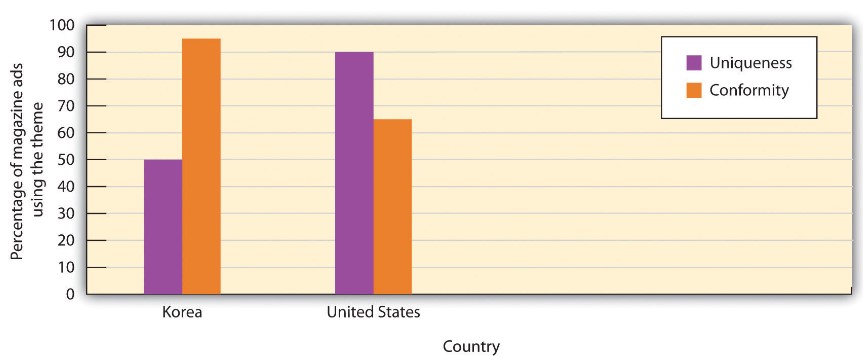Conformity
You have probably noticed that we often adopt the preferences, actions and attitudes of the people around us like fashion, music, foods, and entertainment. Our views on political issues, religious questions, and lifestyles also reflect, to some degree, the attitudes of the people we interact with. Decisions about risk-taking behaviors such as smoking and drinking are also influenced by whether the people we spend time with engage in these activities. Psychologists refer to this tendency to act and think like the people around us as conformity. Consider a classic study conducted many years ago by Solomon Asch (1956). Male college students gave wrong answers to a simple visual judgment task rather than go against the group (Asch, 1956). Variations of Asch’s procedures have been conducted numerous times across many cultures (Bond, 2005; Bond & Smith, 1996) and conformity appears to be a universal construct. Bond and Smith (1996) analyzed the results of 133 studies that used Asch’s line-judging task in 17 different countries that were categorized as collectivist or individualist in orientation. Results were significant, conformity was greater in more collectivist countries than in individualistic countries. Compared with individualistic cultures, people who live in collectivist cultures place a higher value on the goals of the group than on individual preferences. They also are more motivated to maintain harmony in their interpersonal relations.
Conformity and Culture
Kim and Markus (1999) examined conformity using advertisements from popular magazines in the United States and in Korea to see if they emphasized conformity and uniqueness differently. As you can see Figure 1, the researchers found that while magazines ad from the United States tended to focus on uniqueness (e.g., “Choose your own view!”; “Individualize”) Korean ads tended to focus more on themes of conformity (e.g., “Seven out of 10 people use this product”; “Our company is working toward building a harmonious society”).

Although the effects of individual differences on conformity tend to be smaller than those of the social context, they do matter. And gender and cultural differences can also be important. Conformity, like most other psychological processes represents an interaction between culture and the individual.

